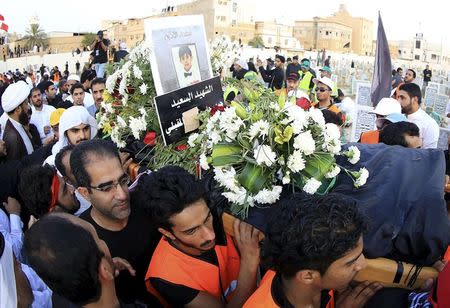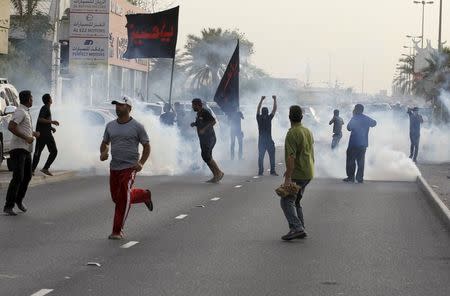Bombing exposes Saudi failure to curb sectarian strains
By Sami Aboudi DUBAI (Reuters) - A suicide bombing in Saudi Arabia as it presses on with its war against Shi'ite fighters in Yemen has exposed the Sunni kingdom's failure to curb sectarianism at home and prompted fears that such tensions can only get worse. Islamic State, which claimed Friday's attack on a Shi'ite mosque, is trying to stir up sectarian confrontation as a way of hastening the overthrow of the ruling Al Saud, and is keenly aware of the war's potential for pitting Sunni against Shi'ite. At stake is the stability of the world's top oil exporter, a U.S. ally that has escaped the post-Arab Spring turmoil tearing up Iraq, Syria and Libya. Saudi authorities have avoided using openly sectarian terms to describe the Houthis, allies of Iran who adhere to the Zaydi sect of Shi'ite Islam, but many journalists, clerics and social media users have shown no such restraint. Saudi King Salman condemned the mosque attack, saying he was "heartbroken" over the violence and Crown Prince Mohammed bin Nayef flew to the eastern province, along with the Mufti -- the kingdom's top Sunni religious authority -- to offer condolences. King Salman also vowed to bring those behind the bombing and those who sympathize with it to justice. But analysts say Saudi Arabia and some other Gulf Arab states have done little to crack down on an outpouring of online venom, a discourse which Shi'ites say provides an incubator for violence against the minority sect. National identity in Saudi Arabia is closely bound up with the strict Wahhabi Sunni school, which views Shi'ism as heretical, and whose leading clerics sometimes publicly cast doubt on whether Shi'ites are truly Muslim. The language of hate has grown bolder during the course of the Yemen campaign, launched after the Houthis seized much of that country last September in what Riyadh saw as an expansion by Shi'ite Iran's influence over Sunni Arab lands. IRAN FEARS Now with the mosque attack, sectarian relations could feel more strain. While Saudi authorities wish to discourage violence on home soil, there are limits to how much they can rein in anti-Shi'ite rhetoric given the fears aroused by an assertive Iran. "There are those who are trying to divide Saudi society on a sectarian basis," said Tawfiq al-Seif, a Saudi thinker. He said the bombing, the second significant attack against Shi'ites in six months, "rekindles a feeling of fear that we are not looking at isolated incidents". Kuwaiti analyst Ghanim al-Najjar said the bombing occurred "in the context of turning a blind eye to the discourse of hate throughout the region". "This discourse of hate is the incubator of this violence." Toby Matthiesen, a research fellow of Islamic and Middle Eastern Studies at the University of Cambridge, agreed. "After last year’s attack in al-Ahsa, there was a lot of positive sentiment from many Saudis from across the kingdom, who denounced the attack," Matthiesen said, referring to shootings that killed seven Shi'ites in November. "We also have seen a lot of denunciations this time, but at the same time we have seen some applauding the attack. So I think this time, the attack may well deepen divisions, particularly as it comes in the wake of the Yemen war." Khaled Almaeena, editor at large at the English-language Saudi Gazette, wrote that those who carried out the al-Qadeeh attack were driven by "an insane ideology disseminated by self-appointed clerics and reformers. "For too long, we have kept quiet as they used the mosques, the media and all other forms of communication to spread their evil philosophy," he wrote in a column on Sunday. "We did not do anything and watched silently as some imams spewed hatred and spread falsehood about Muslims of other sects." ISLAMIC LAW Traditional Wahhabi doctrine is ultra-conservative, viewing Shi'ites as heretical, arguing against interaction with non-Muslims, opposing gender mixing, imposing a strict version of Islamic law and urging resumption of early Muslim practices. Shi'ites complain that some Sunni clerics, with hundreds of thousands of online followers, regularly attack members of the minority sect as apostates, rejectionists and Safavids -- a reference to a 16th century Persian ruling dynasty that introduced Shi'ite Islam to what is now Iran. Analysts say sectarian discourse escalated after the Saudi-led military campaign against the Houthis began on March 26. "Labels such as enemies and traitors are regularly used. These give an excuse for militants to target Shi'ites," said Waleed Sulais, a researcher at the Saudi Adalah Centre for human rights who is also a Shi'ite. Some have called for the arrest of prominent Shi'ite figures in Saudi Arabia, including al-Seif, while others launched what they called the "Storm of Deletion" -- to push for getting Shi'ite television stations off the air. Mohsen al-Awaji, a prominent Sunni Islamist activist, said the Saudi-led campaign in Yemen, if anything, had reduced sectarian tensions and Shi'ites in the Gulf were not being targeted. There were however limits to this tolerance. "One cannot be silent at those who raise pictures of (Iranian-backed) Hezbollah and to Iranian leaders in public," he said. Hate speech is not the preserve of Sunni clerics loyal to Riyadh. Islamic State leader Abu Bakr al-Baghdadi, in a speech a week before the Qadeeh attack, dismissed the Al Saud as "guard dogs" of the West and Israel. Islamic State's enemies, including Shi'ites, were "allies of Satan". Al-Seif said senior Saudi officials have rarely made any public gestures towards Shi'ites that would send a clear message to the dominant Sunni majority that targeting the minority sect would not be tolerated. He said one sure way to send such a message to hardliners was to issue laws that would safeguard "national unity" and criminalize hate rhetoric. "I believe that fighting and dismantling the incubator of terrorism is what will be useful in the long run," al-Seif said. "The government needs to look into political and legal measures, including a law that would preserve national unity and criminalize hate," he said. (Reporting by Sami Aboudi; editing by William Maclean and Giles Elgood)

 Yahoo News
Yahoo News 


